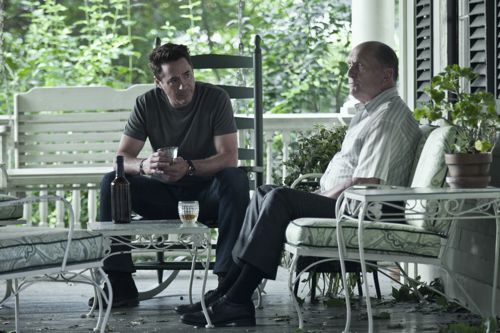
It was the folks over at Vulture who first noticed that The Judge is essentially the same movie as This Is Where I Leave You: City slicker comes home after the death of a parent; an old love reemerges; a car accident factors heavily in the plot; and, curiously, Dax Shepard is on hand. That tells you something about both films—they’re seriously by-the-book. (Although in this case, the coincidences move beyond clichés and actually border on freaky—for example, both Jason Bateman and Robert Downey Jr.’s characters are forced to sleep in absurdly cramped rooms).
Here, Downey Jr. plays cocky defense attorney Hank Palmer (of course, adding “cocky” in front of a Downey Jr. character name at this point is strictly academic) who, while in court, gets the news that his mother died, forcing him to fly home to Indiana. Cue the stock footage of a small town: Nice grocery boys loading bags into the car of an old lady; four tow-headed young lads in the back of a pickup truck, fishing rods in hand; American flags rippling in the wind.
Hank has been estranged from his gruff, but honorable father, Judge Joseph Palmer (Robert Duvall), for years, and although the film doesn’t initially don’t say why, it doesn’t exactly take a detective to figure it out. Here’s a hint: Hank has two older brothers: sweet and simple Dale (Jeremy Strong), who has an unspecified brain disorder; and Glen (Vincent D’Onofrio), a stud baseball player who was bound for the pros before he damaged his hand in a mysterious car accident.
Hank can’t wait to get back to the big city (Chicago in this case), despite the fact that he’s resumed a flirtation with his high school sweetheart Samantha (Vera Farmiga), an earthy and hard-drinking woman who now owns a bar. But then, the film’s real action kicks in: Judge Palmer is accused of killing an old nemesis and Hank has to stay in town to defend him, whether daddy likes it or not. (Dax Shepard plays the way-out-of-his-league small town lawyer whom the judge initially obtains; Billy Bob Thornton is the reptilian prosecutor.)
The performances are unsurprisingly good here, even if Downey Jr. and Duvall could both play these roles in their sleep. (Can casting be too on the nose?). Despite pretending to hate the grizzled old bastard, Hank is secretly desperate for his father’s approval, and that’s the source of most of the film’s emotional impact.
There are some bizarre things at play, however. Hank makes out with a much young woman at a bar, only to find out that she MIGHT be his daughter. (Why, The Judge, why?) Then, the big reveal of why Judge Palmer and Hank resent each other comes during an inappropriately personal courtroom interrogation. I half-hoped the judge would yell, “Take it on Oprah, boys. This is a courtroom!”
But there’s a beautiful scene where Hank helps his father with an embarrassing bathroom incident—and it manages to tease humor out of something that most films would play strictly for pathos. Another scene, with Hank and his father on a boat, definitely put a lump in my throat. Yes, it’s overlong and overly clichéd, but The Judge is not completely ineffective. It’s a film that asks you to park your big-city cynicism at the door. Is that really such a bad thing?
